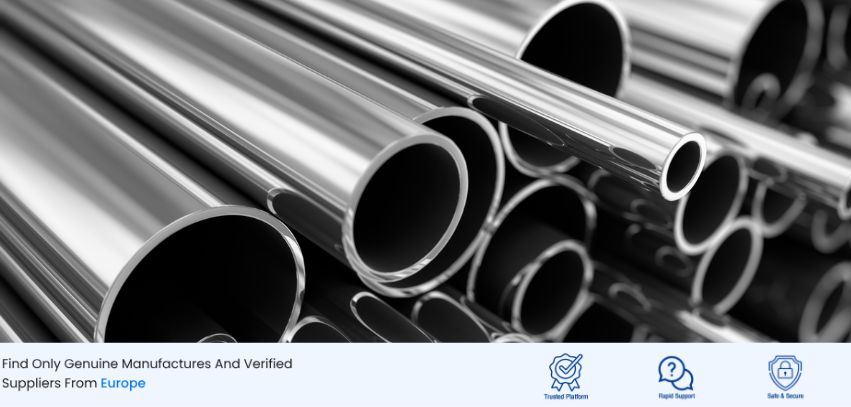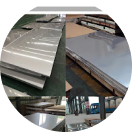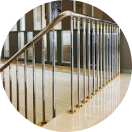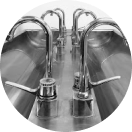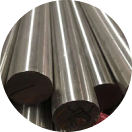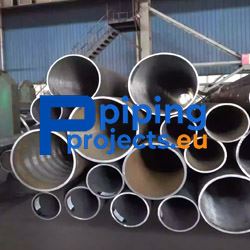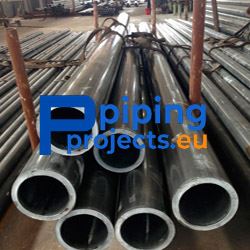Alloy Steel Pipe Manufacturers, Suppliers & Exporters in Europe - PipingProjects.eu
PipingProjects.eu is one of the leading Alloy Steel Pipe Manufacturer in Europe. We are recognized for delivering top-tier, seamless ferritic alloy steel pipes. As a dependable Alloy Steel Pipe Supplier in Europe, our unwavering commitment to quality is reflected in our strict adherence to industry standards. Our alloy steel pipes boast exceptional high-temperature strength and impressive corrosion resistance. Opting for PipingProjects.eu signifies choosing a reliable supplier for premium alloy steel pipes that consistently exceed the most stringent industry benchmarks. Your satisfaction and confidence in our products are assured, making us a trusted partner for your alloy steel pipe needs.
What are Alloy Steel Pipe?
Alloy Steel Pipes are employed in applications demanding moderate corrosion resistance, durability, and cost-effectiveness. In essence, alloy pipes become the preferred choice where standard carbon steel pipes may fall short. These alloys can be classified into two categories: High Alloys and Low Alloy Steels.
We provide a diverse range of alloyed pipes tailored to meet the demands of industries requiring enhanced corrosion resistance and durability. Our commitment to offering high-quality Alloy Steel Pipes ensures reliable solutions for applications positioning us as a preferred supplier across various sectors in Europe.
Top leading Manufacturing Companies
Where to find reliable Alloy Steel Pipe Suppliers in Europe?
PipingProjects.eu is a distinguished Alloy Steel Pipe Manufacturer in Europe, renowned for its commitment to delivering top-quality products. As a trusted supplier, we adhere to stringent manufacturing processes, ensuring that our Alloy Steel Pipes meet or exceed international standards. Our emphasis on durability, corrosion resistance, and precise specifications providing tailored solutions for diverse industrial applications.
Beyond manufacturing excellence, we take pride in being a reliable Alloy Steel Pipe Supplier in Europe. Our comprehensive product range, coupled with a customer-centric approach, makes us the preferred choice for businesses seeking high-performance Alloy Steel Pipes. With a focus on quality assurance and adherence to industry standards, we continue to be a trusted partner in providing reliable and durable Alloy Steel Pipes across the European region.
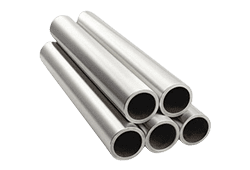
Alloy Steel Pipe
Alloy Steel Pipe - Specifications
- Product : Alloy Steel Pipe
- Size : 1/8″NB TO 48″NB IN
- Schedule : SCH20, SCH30, SCH40, STD, SCH80, XS, SCH60, SCH80, SCH120, SCH140, SCH160, XXS
- Forms : Seamless / ERW / Welded / Fabricated / LSAW Pipes
- Standards : JIS, AISI, ASME, ASTM, AMS, GB, DIN, EN, GOST
- Method : Hot Rolled & Cold Rolled

Trusted
Supplier

Genuine
Product

Easy
purchase
Common grades of Alloy Steel Pipes and their properties?
Alloy Steel Pipes come in various grades, each designed to meet specific mechanical, chemical, and temperature requirements for diverse applications. Common grades include ASTM A335 P1, P5, P9, P11, P22, and P91, which are widely used for high-temperature and high-pressure applications. These grades exhibit enhanced properties such as increased tensile strength, corrosion resistance, and heat resistance.
For example, P91, a chromium-molybdenum Alloy Steel, offers excellent creep strength and corrosion resistance at elevated temperatures. P5, with added chromium and molybdenum, provides improved strength and oxidation resistance. The choice of grade depends on the intended application, with each grade offering a unique combination of properties to suit specific industrial needs.
Alloy Steel Pipe Grade Hardness Chart
Explore the Alloy Steel Pipe Grade Hardness Chart for comprehensive information on material strength and durability, ensuring precision in selection for diverse industrial needs, offered by a trusted Alloy Steel Pipe Supplier in Europe.
Alloy Steel Pipe Hardness Chart
| Alloy steel grades |
Hardness (Brinell Hardness, HB) |
| P1 |
143-207 |
| P2 |
143-207 |
| P5 |
187-255 |
| P5b |
187-255 |
| P5c |
187-255 |
| P9 |
179-217 |
| P11 |
163-207 |
| P12 |
163-207 |
| P15 |
– |
| P21 |
– |
| P22 |
163-207 |
| P23 |
– |
| P24 |
– |
| P36/ P36 class 1 |
– |
| P91 |
190-250 |
| P92 |
190-250 |
| P122 |
– |
| P911 |
– |
Best practices for preventing corrosion in Alloy Steel Pipes?
As a trusted Alloy Steel Pipe Manufacturer in Europe, these best practices contribute to the prevention of corrosion, ensuring the reliability and durability of Alloy Steel Pipes in various industrial applications.
- Protective Coatings: Apply corrosion-resistant coatings such as epoxy or zinc to create a barrier between the Alloy Steel surface and corrosive elements.
- Regular Inspections: Conduct routine inspections to identify and address any signs of corrosion promptly, preventing its progression.
- Cathodic Protection: Utilize sacrificial anodes or impressed current systems to redirect electrical current away from Alloy Steel Pipes, reducing the risk of corrosion.
- Proper Drainage: Design systems with adequate drainage to minimize the accumulation of moisture, a key contributor to corrosion.
- Corrosion-Resistant Alloys: Select alloys with enhanced corrosion resistance properties, ensuring longevity in challenging environments.
- Material Compatibility: Ensure compatibility between the transported fluid and the Alloy Steel material to mitigate corrosion risks.
- Regular Maintenance: Implement a proactive maintenance schedule, including cleaning and reapplication of protective coatings, to extend the life of Alloy Steel Pipes.
Applications of Alloy Steel Pipes in Europe?
Alloy Steel Pipes find widespread applications across diverse industries due to their durability, strength, and versatility. As a top Alloy Steel Pipe Manufacturer in Europe, we deliver reliable solutions for fluid transport, heat exchange, and more, meeting diverse industrial needs with quality assurance.
- Oil and Gas Industry: Alloy steel pipes are widely used for transporting oil, gas, and other fluids in pipelines due to their durability and corrosion resistance.
- Power Generation: Alloy steel pipes find applications in power plants for conveying steam and fluids at high temperatures and pressures.
- Aerospace Industry: In Europe, Alloy Steel Pipes are utilized in aerospace engineering for their lightweight properties and corrosion resistance.
- Automotive Sector: Alloy steel pipes play a crucial role in the automotive industry, especially in manufacturing exhaust systems for their strength and resistance to corrosion.
- Chemical Processing: These pipes are employed for transporting corrosive chemicals safely in chemical processing plants.
- Construction: Alloy steel pipes are used in construction for structural components that require enhanced strength and durability.
- Renewable Energy Projects: Alloy steel pipes are utilized in various renewable energy projects, including those related to wind and solar power.
- Shipbuilding: In the marine industry, Alloy Steel Pipes are essential for constructing seaworthy vessels due to their corrosion resistance in saltwater environments.
Advantages of using Alloy Steel Pipes
- The utilization of Alloy Steel Pipes offers several distinct advantages across various industrial applications. First and foremost, Alloy Steel Pipes provide enhanced strength and durability, making them well-suited for environments with high pressures, temperatures, or corrosive elements. The alloying elements, such as chromium, molybdenum, and nickel, contribute to improved mechanical properties, ensuring the pipes can withstand challenging conditions.
- Another notable advantage is the corrosion resistance offered by Alloy Steel Pipes. The alloying elements create a protective layer, reducing vulnerability to rust and corrosion. This makes Alloy Steel Pipes particularly valuable in industries where exposure to harsh chemicals, corrosive substances, or extreme weather conditions is common.
- Additionally, the versatility of Alloy Steel allows for the customization of pipes to meet specific application requirements, providing a reliable and efficient solution for a wide range of industrial needs. Overall, the use of Alloy Steel Pipes combines strength, durability, and corrosion resistance, making them a preferred choice for demanding applications in sectors such as oil and gas, power generation, and chemical processing.
Various Types of Alloy Steel Pipe We Supply
PipingProjects.eu is a leading Alloy Steel Pipe Manufacturer in Europe. We supply different types of Alloy Steel Pipes to meet diverse industrial needs with superior quality and precision.
How to choose the right Alloy Steel Pipes for High Temperature Applications?
- Selecting the appropriate Alloy Steel Pipe for high-temperature applications is a crucial decision that hinges on various factors. As a manufacturer, the alloy composition is a primary consideration. Alloys like ASTM A335 P11 or P22, enriched with elements such as chromium and molybdenum, are tailored to provide the requisite high-temperature strength, oxidation resistance, and thermal stability.
- Understanding the operational conditions is equally vital. Factors like the temperature range and potential exposure to corrosive elements guide the choice of alloys with optimal corrosion resistance at elevated temperatures. Moreover, adherence to stringent manufacturing standards ensures the reliability and performance of the Alloy Steel Pipes under demanding high-temperature scenarios.
- Collaborating with experienced Alloy Steel Pipe Manufacturers in Europe facilitates a comprehensive approach. Their expertise aids in navigating alloy choices, optimizing heat treatment processes, and ensuring that the manufactured pipes align precisely with the specifications required for high-temperature applications. This collaborative approach guarantees the delivery of Alloy Steel Pipes that meet the rigorous demands of diverse high-temperature environments.
Manufacturing Process of Alloy Steel Pipes
Alloy Steel Pipe is produced in seven steps. It manufactures a wide range of shapes, goods, and parts, ranging from Alloy Steel Pipe and Coil.
- Step 1 : Raw Material Selection
To begin the process of creating Alloy Steel, raw materials such as iron ore and other elements including nickel, chromium, and molybdenum are carefully selected. The choice of alloying elements depends on the specific properties that the Alloy Steel is intended to possess.
- Step 2 : Smelting and Melting
Once the raw materials have been selected, they are smelted in a furnace to create a molten metal alloy. The composition of the alloy is closely monitored and controlled to achieve the desired grade of Alloy Steel.
- Step 3 : Forming
After the molten Alloy Steel has been produced, it is cast into different shapes and forms, depending on its intended use. The most common shapes include slabs, billets, blooms, or ingots.
- Step 4 : Primary & Secondary Steelmaking
The subsequent step is primary steelmaking, which can be accomplished through different methods such as the Basic Oxygen Furnace (BOF) or the Electric Arc Furnace (EAF). At this stage, impurities like carbon are eliminated to achieve the desired chemical composition.
- Step 5 : Casting
The molten Alloy Steel is then cast into semi-finished forms, which can take the shape of plates, sheets, bars, or other forms. Continuous casting or ingot casting methods are usually employed for this purpose.
- Step 6 : Hot Rolling
In the case of products like Alloy Steel Pipes, the semi-finished castings are hot-rolled to achieve the desired thickness and shape. During this process, the thickness of the castings is reduced while improving their mechanical properties.
- Step 7 : Cold Rolling and Annealing
In the case of specific Alloy Steel products such as thin sheets and coils, cold rolling is employed to further reduce the thickness and enhance surface finish. To relieve stresses and enhance corrosion resistance, annealing is frequently performed.
